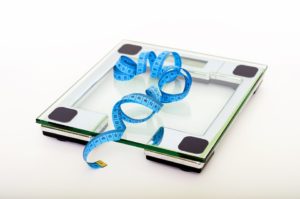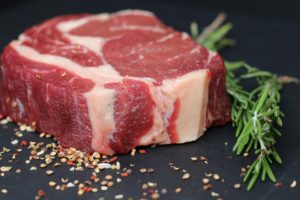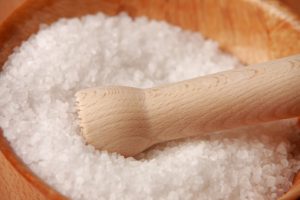Calorie counting didn’t work for me over the long term. It did work at first.
I lost 30 pounds in the first three months of my diet. On my first weigh-in, April 2008, I clocked in at a hefty 285 pounds. Before that, I had been exercising and trying to eat right for the previous three months. I had avoided the scale in those three months, but I couldn’t avoid it any longer. I needed to quantify my weight loss and establish an actual eating plan.
I found a website for tracking calories. I plugged some information into a calculator. The calculator determined I should eat a maximum of 2,450 calories per day. No problem, I thought.
I committed right then and there. Keep my calories to under 2,450 and ride my bike 5-6 evenings per week.
By mid-August, I’d dropped from 285 pounds to 255 pounds. The 30-pound mark is when people begin to notice. “Your face looks thinner,” that was always a good one.

From there, the weight loss became way more gradual. It became all about the calories and not at all about the foods I was eating. Those 100-calorie packs of cookies were my go-to…as long as I logged the calories, right? No food was really off-limits, including junk foods.
That’s good, isn’t it?
No. Junk foods are an occasional treat, at best. They’re terrible for your overall health, and counting calories can be a license to indulge in such crap. As long as you’re under your calories……..
Day after day, month after month, I was a slave to my computer and to a wonky Android app. I was a slave to the website. I eventually started adding other metrics (fat, carbs, protein, sodium, vitamins) when my weight loss stalled, but it didn’t really help. It was just more crap I had to input.
The site I used, the now-defunct Calorie Count, was a good one. One of the best of its kind. Thousands of users. At times, I’d received good peer support. But people came and went, as is the nature with dieting. I made no real lasting friendships when it was all said and done.
The input was a lot of guesswork. When I went out to eat, what were the ingredients? What was the serving size? I couldn’t begin to approximate the number of calories. These apps have gotten better since 2008, sure, but it’s still a commitment that you may not need to make.
What happened?
I was hungry. Never satisfied. The roller coaster was up and down, up and down. The overall trajectory was slightly down. I was exercising more and more, while usually counting my calories. By 2013, my weight hit its lowest point: 217 pounds.
I looked better, was keeping my calories intact on most days. But I was still never satisfied. Veggies, fruits, and nuts, all of which were strongly encouraged, just made me feel like crap. Things like pasta, which were never really discouraged, made me feel terrible.
I fell asleep most nights within an hour of eating. Even if it’s “whole grain” pasta, your body doesn’t know the difference. Lethargy and bloat follow no matter what.
My peers were evaluating my food logs, which I didn’t mind. I thought it would help, in fact. Most provided blind encouragement. One kept telling me, “Eat more veggies! Eat more veggies! Veggies veggies veggies!” No one ever gave me gruff over pasta or cereal, or Subway sandwiches, as long as they were crammed with veggies and on whole-wheat bread. Everyone raved over my oatmeal breakfasts, which I fooled myself into liking, but they never left me satisfied.
Those peers all meant well. Don’t get me wrong. Like me, they didn’t know better. We were all being lied to; the food pyramid was our Bible.

“That’s too much red meat, Steve.” I heard that a few times. And when they told me, I believed it. I should cut back on that stuff and become a pescatarian, I thought.
Over the long haul
I kept the routine up through the first eight or nine months of 2014. Logging nearly every day, except for the occasional “cheat day.” Biking a few times a week. I’d done a few group rides, most of which went well, but there was one where I got dropped. I was following the “everything in moderation and get your exercise in” mantra, but I still was not up to snuff from a fitness standpoint.
Eventually, I quit logging. I quit riding for the most part as well. By February of 2015, I’d ballooned back up to 239 pounds. I’d become “satisfied” (stuffed like a pig–miserable, really) again, at the expense of my weight. And at the expense of my energy and overall wellness.
It had taken a long time, but the calorie counting and constant number-crunching just didn’t cut it and I drifted away. As most people do.
I got back into the calorie counting again, blaming my own lack of self-discipline for my failure, rather than the wrong overall approach.
Soon after I got back into the swing of things, Calorie Count shut its proverbial doors in January of 2017. I was forced into exporting all my old data onto Excel spreadsheets after being given a deadline by Calorie Count to do so.
I found a new calorie-counting website, but I found that to be less user-friendly than Calorie Count and with less support. Once again, I drifted away.
My conclusion with counting
It works in the short-to-medium term. Clearly, it did, as I demonstrated.
But this method, the constant reliance on technology and apps, (and the threat of a site going offline) wasn’t the way for me to go for a sustainable total change of lifestyle.
Another problem I see with these sites is they often give your bad marks for too much fat and sodium. Sodium is actually essential and helps your body’s fluid balance. For healthy people, it’s a net positive. I fretted over sodium in my counting days. That was before I’d ever been taught the benefits, which the American Heart Association even acknowledges.

Sodium was a boogeyman all through my childhood and for 20 years of adulthood.
The calorie-counting website’s pretty little graphs never thought highly of fatty foods, either. Fatty cuts of pork and beef were all a no-no.
Remember, this isn’t simply a diet. It is a lifestyle change. It is a beast we will all have to fight for the rest of our lives. But with the right tools, we can fight this beast and keep it at bay easily. Ultimately, calorie counting didn’t work as a tool in my arsenal.

Leave a Reply